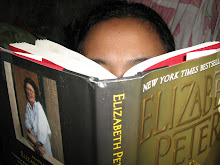I just finished reading "By Telephone", an English translation of Por Telefono, Jose Rizal's wickedly funny satire on the Spanish friars, which I found in full text version on Filipiniana.net. According to the executive summary, the satire was Rizal's response to the censorship of his Noli Me Tangere. In it, he depicts the friars as being very humble and virtuous even though they had taken vows of "wealth, pride and licentiousness".
As the title states, the piece focuses mainly on a telephone conversation between the Augustinian's Father Provincial in Manila and his procurator in Madrid. (Hindi pa uso si Hello Garci noon, but it sure rings a bell!) My favorite part was when he told the procurator, "Meanwhile, I impose as a penance upon you, who are neither a braggart nor a fool, that you have your picture taken in various poses, but always in the attitude of meditating, of writing a sermon, with a pen in your hand, a lamp beside you, with spectacles on even though you don't need them. Do you understand? Then have the pictures exhibited in public so that everybody may say, although nobody believes it: 'What a thinker he is. What a great orator this Salvadorcito Tont must be! He's always writing sermons. He doesn't even have time to get his picture taken!' This will cause you suffering but in spite of your having taken vows of wealth, pride and lustfulness, don't mind it. Don't forget to have your picture taken in a pensive altitude and as an actor! Good-by!"
"By Telephone" is only one of the numerous Rizal documents in the extensive Rizaliana collection of Filipiniana.net. named, appropriately enough, "The Complete Jose Rizal", which was just launched today, June 19, 2008, in time for Rizal's birthday. The Complete Jose Rizal, which was undertaken by Filipiniana.net in cooperation with the National Historical Institute, contains a complete bibliography of all of Rizal's literary works, professional notes, and correspondence, including full text versions of the originals and their translations, as well as of materials written about Rizal. It also has a gallery of over 100 images, among them photographs of Rizal, his family and friends, his artworks, and yes, even his women *giggle*. The correspondence numbers over 900 letters between Rizal and his family and friends, I am told, and includes three never-before-seen letters from Rizal to his family. (Whew! He only lived 35 short years and kept traveling all over the planet. He turned out quite a lot of literary works-- poems, essays, and even novels-- and artworks --paintings, illustrations and sculpture. Where'd he get the time to write all those letters, and still have time left over to go to parties and gatherings and dally with girls? No kidding, he really was a hero!)
Who was Rizal, really? I was doing some research about something else some time ago when I stumbled over a copy of Vicente Albano Pacis' 1952 Philippines' Free Press article "Rizal in the American Congress." Huh? The piece narrates an encounter between the author and Wisconsin Congressman Henry A. Cooper in 1926, in which Cooper talks about how the American Congress was finally persuaded to grant the Philippines its independence. According to Cooper, Rizal, then already a few years dead, "came to the rescue." During his speech sponsoring the Philippine Bill of 1902, Cooper said: “It has been said that if American institutions had done nothing else than furnish to the world the character of George Washington, ‘that alone would entitle them to the respect of mankind.’ So, sir, I say to all those who denounce the Filipinos indiscriminately as barbarians and savages, without possibility of a civilized future, that this despised race proved itself entitled to their respect and to the respect of mankind when it furnished to the world and character of Jose Rizal." Cooper then quoted the "Ultimo Adios" and concluded "Sir, the future is not without hope for a people which, from the midst of such an environment, has furnished to the world a character so lofty and so pure as that of Jose Rizal." Reminiscing, Cooper told the writer “The story and poetry of Rizal did something to the House akin to a miracle,” because he "kindled a light" that became the turning point leading to the passage of the bill.
Novelist, artist, sculptor, doctor, poet, nationalist, linguist, son, brother, lover, husband, hero, genius. That's Rizal -- a person who embodied so many facets of the best of being human. In Filnet's The Complete Jose Rizal collection, we discover more and more of those facets, inspiring us and showing us what we could become. When we truly realize who Rizal was, we realize just how great a thing it is to be a Filipino.
Happy birthday, Rizal!
(also published on the Filipiniana.net blogsphere)











